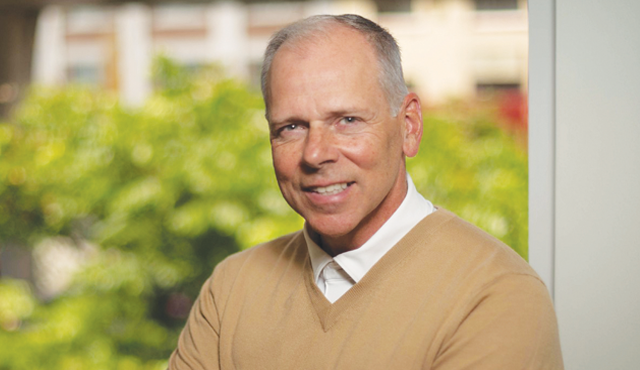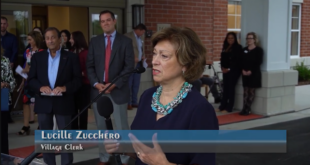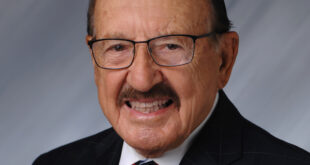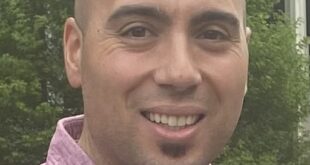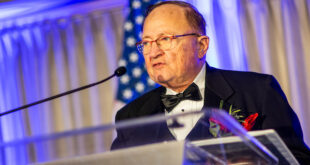A high-powered corporate executive for most of his career, Thomas Vozzo took a leap of faith more than a decade ago and dedicated himself to helping former gang members turn their lives around.
As a middle-class kid who went on to forge a successful career in the corporate world, Thomas Vozzo hardly had anything in common with former gang members who’d been to prison.
And yet, Vozzo has thrived personally and professionally in his role as CEO of Homeboy Industries, a nonprofit in Los Angeles that provides job training and support services to formerly incarcerated people who want to leave the gang life behind. The nonprofit serves about 10,000 clients each year.
Vozzo, 61, author of “The Homeboy Way,” spoke with Fra Noi about his journey, and the message he wants to spread.
Elena Ferrarin: Tell us about your childhood and upbringing.
Thomas Vozzo: I grew up the youngest of four in a typical middle-income family in New Jersey. My dad was a supermarket manager, my mom was a stay-at-home mom who later had part-time jobs. They loved us and taught us good values and morals along the way.
EF: What are your Italian roots and family ties?
TV: My father’s father came over from Calabria, Italy in 1917. Then he went back to Italy, got married, and came back. My father was born a couple of months after. My wife, Lindy, and I love going to Italy. We have two boys: One is 33 and a middle school teacher; one is 31 and a doctor.
EF: For much of your career, you were a global business executive in the service, retail and distribution industries. How did you get into business?
TV: I went to graduate school and I got an advanced degree in mathematics. I had a desire to apply what I learned. I started at a mail-order company in the Boston area. There, I realized I not only had ability on the analytical side, but also the ability to understand the dynamics of business and how to run a successful business, and how to be a manager and a leader.
EF: Your last corporate role was as CEO of the $1.8 billion Aramark Uniform and Career Apparel Group. That must have been a high-pressure job.
TV: It sure was. We had 18,000 employees in over 200 locations in our group. Aramark is a food-service, uniform-service and facility-service business. We had no special patents or techniques. How we got business was by having our frontline employees do a good job with their clients. It really came down to Aramark investing a lot into teaching business skills and managerial skills, not only to me, but to my team as well. I did that for seven years until 2011.
EF: Why did you leave?
TV: Back in 2008, during the Great Recession, the economy was shrinking and every corporation had to do “rightsizing” (downsizing). Two days before Christmas, the chair of the corporation asked me how we would finish the year. I told him we would have a $140 million profit, instead of the usual $150 million. He told me that we made a commitment to Wall Street, and I had to go find the extra $10 million. I was stunned. I knew I had to lay off more people. For the sake of short-term results, we were affecting people’s lives in a negative way. Also, I knew the $10 million wouldn’t have made a hill-of-beans difference in our overall valuation. That was a seminal moment. I thought, “I have to find a better way so employees don’t become secondary to financial interests.” I left after we finished the restrictions of a private-equity deal we did, and I wanted to find the next chapter in my career.
EF: How did you meet Fr. Greg Boyle, the founder of Homeboy Industries?
TV: I had a friend who was on the Salvation Army board, like me, who invited me to the Homegirl Café run by Homeboy Industries, on whose board he also was. I still remember having lunch there and looking at the workforce, former gang members who have been incarcerated, interacting with customers and seemingly enjoying themselves. Looking at them, I realized I would have never hired them in my corporate days. And Homeboy Industries not only hired them but helped them move their lives forward. My friend asked me to get involved, so I started volunteering my business skills. Soon after, I met Fr. Greg, who asked me to come on board as CEO. I am so glad he asked me to take that leap of faith.
EF: What is Fr. Greg like?
TV: He’s a living saint. There is so much to be learned from him. Greg often talks about God being too busy loving us to be judging us. At Homeboy, you see that tangibly, by Fr. Greg helping out people who have been demonized and forgotten, loving people that society wants to throw away. He’s got a way of thinking about people that we should all ascribe to.
EF: What have you accomplished as CEO of Homeboy Industries?
TV: When I first came on board, Homeboy was about an $11 million organization. Now, we are a $45 million organization. We quadrupled in size and we serve that many more people. It is far more pressure being the CEO of Homeboy Industries, because I know the cost of failure is high. If we can’t find the money each year to serve people, those folks are back in the street with gangs, and their lives are spiraling down. I am also proud that two-thirds of our management team are former clients. We have invested a lot of resources and mentoring into our clients.
Homeboy has helped me move forward on my own spiritual journey, not just through Fr. Greg but through the homies, and seeing how they have leaned on their faith to move forward with their lives. If they have done that, I should be able to do that as well.
EF: What makes Homeboy’s program successful?
TV: When you measure the recidivism rate, we are only at 30% versus the statewide average of 70%. Each week, 15 people show up who want to change their lives. Of those 15, we can only take two.
EF: What makes Homeboy Industries special?
TV: It sounds cliché, but it’s as simple as kinship, love and nonjudgment. For the first time in their life, clients are finding positive attachment, someone who trusts and believes in them. Our secret sauce is pretty straightforward.
EF: What are your plans for the future?
TV: The organizational goal is to double in size again and have people from within run the organization. We want homeboys running Homeboys. It might take five or six years.
EF: What are your personal goals?
TV: In my book, I talk about faith and my journey of running a nonprofit. I also talk about the struggles of the working poor. I am really motivated to shed light on this. For 45 years, the poverty rate in America has been about the same (between about 11% and 15%, according to government data). If the corporate world would do more things like Homeboy — provide quality jobs, hire the working poor, have support services around that — it would make such a difference. I want to spread that message.
For more, click here.
The above appears in the January 2024 issue of the print version of Fra Noi. Our gorgeous, monthly magazine contains a veritable feast of news and views, profiles and features, entertainment and culture. To subscribe, click here.
 Fra Noi Embrace Your Inner Italian
Fra Noi Embrace Your Inner Italian


